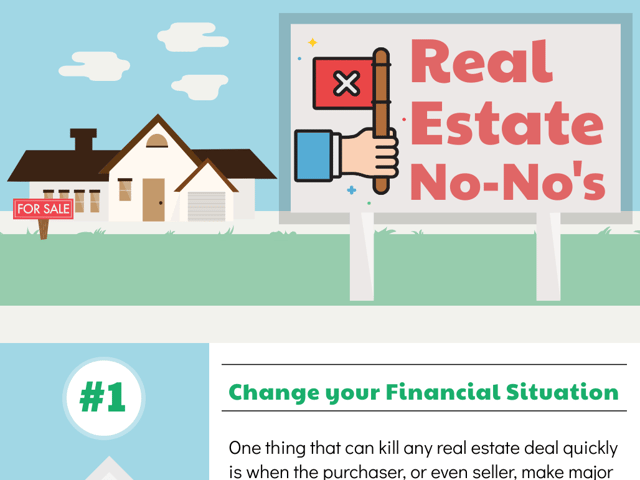
Real Estate No-Nos, Penalties, and Enforcement of the Rules
Purchasing or selling real estate can be fraught with uncertainty, especially if it is your first time going through the process. However, certain actions are ill-advised and some can have rather severe penalties. Before moving forward with the real estate transaction process, it’s a good idea to know the major prohibited and discouraged actions.
These are things you should not do:
Change your Financial Situation
One thing that can kill any real estate deal quickly is when the purchaser, or even seller, make major changes to their financial situation. This can include making another major purchase or even changing banks. Even if you were pre-qualified, a change like this can result in the failure to secure funding.
Fail to Disclose All Information
Sellers are legally required to disclose any information that a buyer might need to know, particularly about the condition of the home and the presence of any health hazards. Laws governing this vary by state, but a failure to adequately disclose information almost always results in legal liability.
Sign for your Significant Other
Real estate transactions require a huge amount of paperwork. Simply forgetting one signature can result in a hassle, and if you are buying with your partner, it may be tempting to sign for them if they are not present. However, even with their verbal approval, this action is considered fraud. It is technically punishable by prison and/or large fines.
Visit the Property Alone
When purchasing a property, it’s important to remember that it is not yours until you’ve closed. Even the day before closing, it still does not belong to you. This means that visiting without your agent or permission is legally considered trespassing, which may have varying punitive repercussions, depending on local laws.
Inquire About or Provide Specific Neighborhood Information
Inquiring about certain aspects of a neighborhood, such as the economic composition or crime rate, may seem benign but, in doing so, both you and your agent violate the Fair Housing Act.
Take Photos During an Open House
Again, this action seems benign, particularly if you really liked the house and wanted to get other opinions on it. However, it is a violation of the First Amendment’s Right to Privacy. The owner still has this right, and if they exert it, deleting the photo will generally resolve the issue. If you refuse, harsher penalties may apply.
Skip the Home Inspection
A home inspection is generally not required for the sale of a home and failure to complete one does not result in any legal action. However, for buyers, the cost of a home inspection is generally well worth it, since it can reveal costly issues that may change your perspective on purchasing this property.
While there are other key actions and pieces of advice that can help the home-buying process go more smoothly, the ones above can result in criminal and legal liability or huge financial risk. Keeping them in mind will help to ensure that the process goes off without an unexpected hitch.
Keep Reading

Real Estate License Exam Blog
How Hard is the Texas Real Estate Exam?
Starting a real estate career in Texas is an exciting venture. One of t…

Real Estate License Exam Blog
What’s on the California Real Estate Exam?
The California Real Estate Exam is a critical step for anyone looking t…

Real Estate License Exam Blog
How to Do Well on the Georgia Real Estate Exam
The Georgia Real Estate Salesperson Examination is required by the Geor…